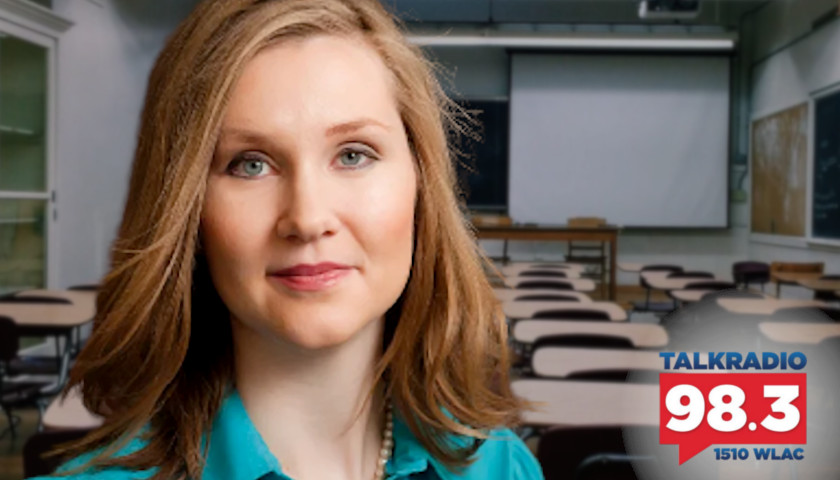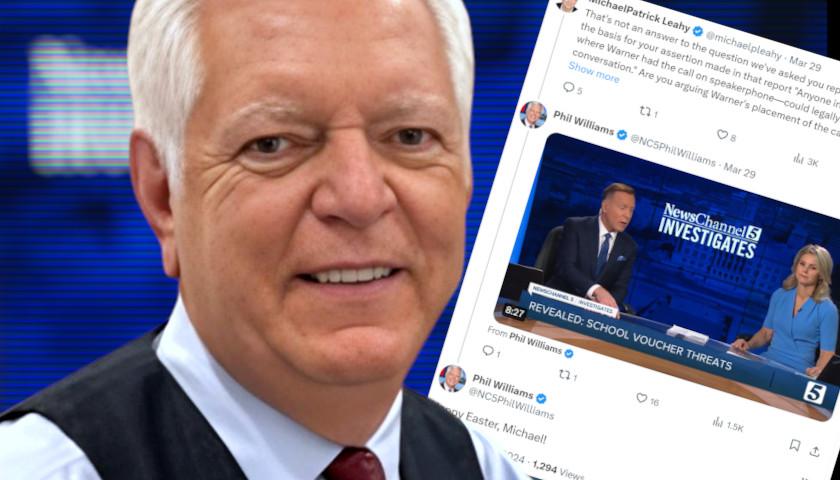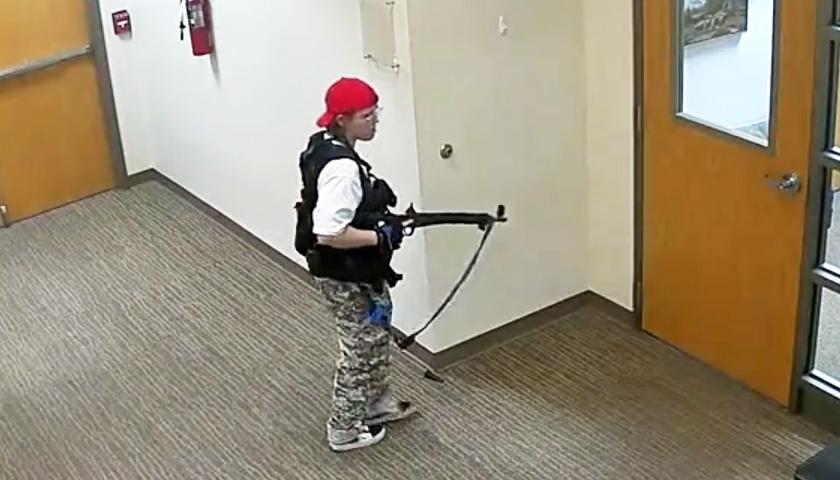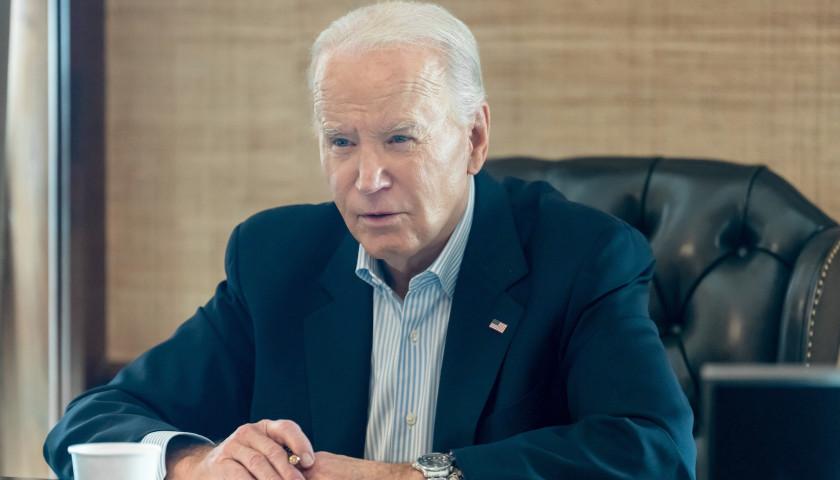Live from Music Row Friday morning on The Tennessee Star Report with Michael Patrick Leahy – broadcast on Nashville’s Talk Radio 98.3 and 1510 WLAC weekdays from 5:00 a.m. to 8:00 a.m. – host Leahy welcomed Federalist Executive Editor and Author Joy Pullmann to the newsmakers line to discuss her role and bringing education policy from the federal level to the states.
Leahy: We are delighted to be joined on our newsmaker line by Joy Pullmann the executive editor of The Federalist and expert on education and policy and just a fabulous writer. Joy, welcome to The Tennessee Star Report.
Pullmann: Good morning. Thank you.
Leahy: You are a Hillsdale College graduate. we have on our staff at The Tennessee Star our news site, the tennesseestar.com. A fabulous reporter named Corinne Murdock. Another Hillsdale College graduate. We think Hillsdale is great.
Pullmann: Me too.
Leahy: The one thing that will astonish our listeners, you are not only the executive editor of The Federalist but you are also the mother of six.
Pullmann: Correct.
Leahy: So it’s 5:30 in the morning. You’re spending half an hour with us. Where are the kids?
Pullmann: They’re all sleeping. (Laughter) Thank heavens. Actually one of them was just a wake up about a half an hour ago. The baby wakes up to eat at night so I’m already up. This is when I can get anything done. (Chuckles)
Leahy: Do you ever get any sleep Joy?
Pullmann: Actually my husband takes over baby time in the middle of the night so I can get some sleep.
Leahy: Oh my goodness. We’ll get into the education issue here in a little bit. Every time you write it is so clear and so concise and I think you’re probably one of the best writers on the concern in the conservative arena in the country. And I just enjoy it.
Pullmann: That’s amazing. It’s such hard work well. Every word is pain. (Chuckles)
Leahy: I know. I’ve been writing myself. I’ve been writing at Breitbart for about eight and a half years. And then we also add it to The Tennessee Star and all our outlets here. And your right to have a clear concise written language, it’s a lot of work and but you do it so beautifully and we’re delighted that you do that. Tell us also about the role as executive editor of The Federalist. I know Sean Davis who’s also part of that lives here in Nashville. We’ve not had a chance to meet in person. But what a fabulous organization. Tell me what your role as executive editor of The Federalist entails.
Pullmann: Well, I’m basically in charge of editorial so that just means that the folks who are junior editors are under my supervision and I’m responsible for making sure that we all do a good job and try to cover all the bases of news each week.
Leahy: A lot of work. You are very prolific in terms of the columns that you write. Let’s talk a little bit about education. Things have moved so fast and your schedule is so busy. I think we first talked to you a couple of months ago about coming on. But you’ve written so much in the arena of education. One of your most recent articles is No, Erasing White Authors From School Won’t Help Kids Read Better. Would you like to elaborate?
Pullmann: I started really as an education reporter and I also have experience teaching and developing curriculum. So that’s really actually the area of my focus. But I kind of feel like we’re in an all-hands-on-deck situation politically. So I’ll write about whatever I’m most angry about. (Chuckles)
Leahy: And there’s a lot to be upset about these days as the national federal government has been overtaken by people that don’t really understand America. They don’t like America and want to subjugate about 75 million Americans who voted for Donald Trump.
Pullmann: Yes, and that is I mean, to be honest, it wasn’t completely unexpected. But to watch happen what kind of some of your fears you know said could is still…look, I don’t want to project insecurity and despair but I do think we have to be realistic. This is going to be a challenging time and we are going to have really bad leadership. And so people are going to suffer. People already are suffering.
Leahy: Yeah, I agree with you completely. And also I agree with you entirely about not being of despair. And I’ve talked a lot with people here about the opportunity, I’m calling this Founders Federalism. And the general theme is conservative constitutional populist, that movement has gone through two phases and is about to go to a third in my view.
From the Tea Party movement where there were multiple leaders around the country organized around three principles of constitutionally limited government, fiscal responsibility, and free markets. And that sort of morphed into the make America great again movement with one leader Donald Trump and added American sovereignty and free and fair trade. But kind of didn’t pay a lot of attention to fiscal responsibility.
Well, the president is no longer the president. It’s been a rocky exit for him for whatever reason. And my theory is now it’s time for those of us who live in the 35 states where freedom is still possible for leadership among state legislators and grassroots leaders and donors and governors and gubernatorial candidates to push back against the usurpations of the national federal government. particularly in the area of education. I’m just curious to see if that’s a view of the world.
Pullmann: I absolutely agree with that. I wrote an article recently that was talking about basically like we have are those of us on the right broadly we are making a retreat right? We lost a major election and with it we lost a lot of strategic power and control and the ability to have our interests heard. The Democrats right now talk a big game about unity. But all of their actions really show that they want to crush their opposition.
They’re not interested really in listening as found by the fact that their allies and Big Tech and media completely are shutting down all no discussion. All ideas, all leadership, and voice among the Americans who voted for Trump. In the name-calling thing marrying us really with the idea that we’re like these couple hundred rioters at the Capitol. Which basically all of us would never do that. We think it was horrible. It’s appalling. We love our country and the Capitol represents our country.
But I do think there are good things actually about if we can make it our strategic retreat because our country’s infrastructure of governance really is weak. And that’s been kind of typified by the fact that the Republican Party does a very poor job of really fulfilling its voters’ desires and of really meeting their needs. Their response to the coronavirus didn’t differ almost one bit from Democratic leaders’ response. They have crushed the American dreams and really the livelihood of tens of millions of Americans who are now forced into poverty because they’re banned from work.
And our kids are, over their leadership have been banned from having and in Republican states again, the education. It is really almost indistinguishable from that in a liberal state and that really is a shame because there are you know, the left uses schools basically its propaganda machines. And Republicans have overseen that happening at every level. It’s most visible to everyone in college.
But it’s absolutely happening all the way down to preschool and kindergarten. So these are some societal weaknesses and really failures of leadership. Failures of service to the American people. It is time and it’s past time to be regressed and these are things that we know how to do. But Republicans have been really swayed by their corporate donors. But the corporate donors are going away because they’re all social justice warriors now. So hopefully maybe that clarity of financial, (Chuckles) of financial pain will hopefully give us Republican leaders who actually fight for their voters as Donald Trump did. Which is why people voted for him.
Leahy: We are absolutely on the same page. And you said something very important that in Republican states Republican Governors Republican state legislators have not done enough to push back against the K-12 propaganda of the education establishment. To me Joy that represents a huge opportunity in 2021 and 2022 for state legislatures and governors in these states where freedom is still possible. Tell me your thoughts on that.
Pullmann: Well, it’s going to be really difficult when you have states basically beholden to federal money. The federal government gives about 9 or 10 cents on every dollar that’s spent on public schools. and the average American public school spends about $13,000. a kid. That’s twice as much as the typical private school to educate children and does a much poorer job.
And the federal government’s kind of 10 percent of that outlay each year on children really controls the other 90 percent. Republican lawmakers are going to have to get serious about whether they think that 10 percent is worth sacrificing. For example, just two days ago Wednesday, the same day as inauguration day, I just wrote about this yesterday.
President Biden decided that every institution that gets federal funds must basically transgender all of their private facilities and their athletics. Do Republican governors support what their constituents certainly don’t and is that in the best interests of children? It certainly is not. This is very very clear and obvious and should be an easy issue. But as we all know Republican governors are really kind of cowed by the false and the smears against people on the conservative side that somehow we are a bunch of bigots and racists and horrible people who hate.
(Commercial break)
Leahy: Joy, I want to ask you a general question and then a specific question. First, for those states where freedom is still a possibility if we want to fix a K-12 education, which is turned into the propaganda arm of the Democrat Party these days would it be your suggestion that states ought to tell the federal government you can take your ten percent of federal money and keep it. We’ll run our schools with just state and local money?
Pullmann: I mean the short answer is absolutely yes. As your listeners probably know, the federal government has no constitutional authority over education. That is the state and local matter. And in fact, still, public opinion polls show something. Three-quarters of if not more Americans really think education should primarily be a state and local matter still. So this isn’t just like some colonial relic.
This is still something Americans really believe almost all of them. The vast majority. So the federal government gets control and so Joe Biden only gets the ability to tell public schools you’ve got to put boys in girls locker rooms and girls on boys sports teams. I guess nobody wants to do that. The boys are stronger, but you get the idea. You have male coaches supervising females in the locker room as I’ve also written about that happens.
Joe Biden can do that because states take federal money. So he threatens their federal money. So states just go ahead and comply. And this has been how basically all the most terrible ideas and how public schools got to be in such a mess with such really low-quality academics. Really unable to communicate character to children and so all sorts of other things that really contribute to public schools being such a lowest common denominator environment for kids.
Which is really not what you want if you want a country of excellence. So it’s really driven by the fact that the federal government controls all the schools through its little kind of token pieces of silver that it throws out to states. But states haven’t had the spine to resist it and say look, you’re more expensive. And look at the federal government and companies.
That nine to ten percent with rules upon rules upon rules. And as everyone probably is aware in your audience, these rules really are not in the best interest of children. So for example, one of the prime things the federal government does is claims to be helping special needs kids. And everyone and decent persons agree that we should take the best care possible of all kids would all kids period.
But you know especially kids with special needs. but really the federal government’s rules about helping those kids often just means that they get stuck in this bureaucratic quagmire where schools just check box, check box, check box. And once they get the paperwork in order, they ignore the child. And so that’s really not obviously the best way to actually provide the best care to a child.
So the federal government’s rules really get in the way of doing the best for kids. And they cost more than they provide. So really for all these reasons yes. It is time for states to just recognize that and take care of their own. And they’ll do it better. just like vaccine distribution. Under COVID, many states the ones governed typically by red governors have been much better at doing that than the federal government has been and many other blue States. So let them do that in every other aspect possible like education.
Leahy: So let me ask you a very specific question. We are based here in Nashville, which is the capital of Tennessee and we often have in studio and on the phone members of the Tennessee General Assembly. The state legislature. In fact yesterday we had the Speaker of the House of Representatives of Tennessee on the air here with us. They are good friends of ours.
We talk to these conservative legislators and everything that that you and I think about education they think they aren’t quite ready to take back and to tell the federal government to take that 10 percent and we’ll run the state of Tennessee. My question to you is, would you be willing to talk with and communicate with the Tennessee legislators about this idea that they should send federal money back?
Pullmann: I would actually I’ll be really happy to return to Tennessee. I’ve testified before the state legislature there a couple of years ago on education issues. Actually, I think possibly on two different bills. Parent trigger and Common Core ideas. I have some experience there. Yes. Of course, doing this requires careful planning. But you have to realize you know, what really these legislators are going to be up against is not that this is a bad idea.
It’s in fact an excellent idea. Their opposition is going to be they’re going to have to fight the bureaucracy that benefits from being able to hide among regulations and not give kids the best education possible. And then those people are very powerful. They have a lot of money and they have lots of credentials.
I think the problem with credentials is that it gives people authority that they maybe don’t deserve. There are many people who call themselves experts and go and testify in front of legislators or say I’m in charge of this that and the other. And you say, okay how many kids have you personally taught to read or because of your leadership how many children who are at risk for failing out of school or now in school? Prove that to me. Almost none of them can do that because most education ‘experts’ just manage failure.
Leahy: Absolutely. Well, I’ll tell you what. I will talk to our friends in the state legislature and we know many of them and they’re very friendly. Ironically today they’re wrapping up a special session of the Tennessee General Assembly on education. Sending the money back to the federal government that 10 percent is not on the agenda in the special session. But they come back on February ninth in a regular session. And I think it would be fantastic if we could arrange for you to come down here and testify about this idea before the appropriate committees of the Tennessee House of Representatives and the Tennessee State Senate.
Pullmann: Great. As long as I can bring my baby. (Chuckles) I have done that before. I’ll just hand him to somebody.
Leahy: I think we could we can accommodate that. How old is your baby?
Pullmann: Right now he’s eight months.
Leahy: We will handle the logistics.
Pullmann: Just sit him in a corner and he’ll chew on something. (Chuckles)
Leahy: We will handle the logistics of that. I just have to applaud you for your intellectual leadership in this area. It is time for bold action. It is not time to get along and go along if we want to save this country. We have to start with I think the about 35 states where freedom is still possible. And the way to do that is let’s take back our schools.
Pullmann: I think it’s about family and it’s not just schools, but also family welfare policy. I have a number of friends who work in the family court system. It’s an absolute mess. And if you do not have strong families and strong children, you’re not going to have a strong country.
Listen to the full first hour here:
– – –
Tune in weekdays from 5:00 – 8:00 a.m. to the Tennessee Star Report with Michael Patrick Leahy on Talk Radio 98.3 FM WLAC 1510. Listen online at iHeart Radio.
Photo “Joy Pullmann” by The Heartland Institute.




